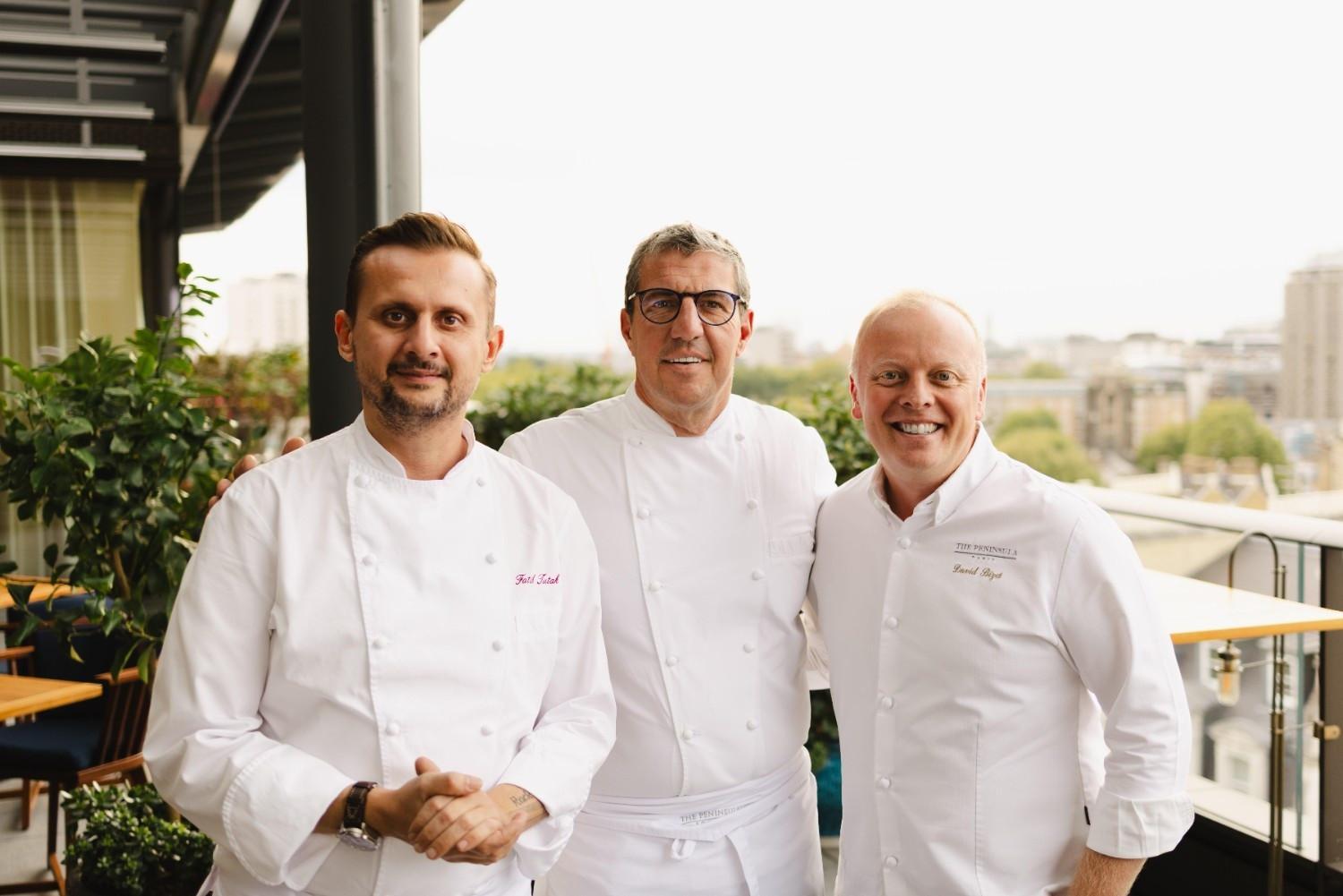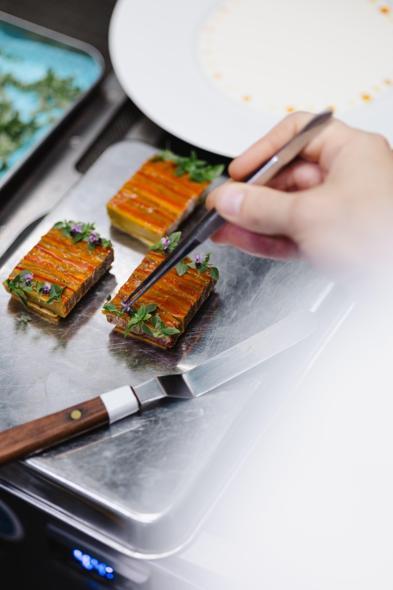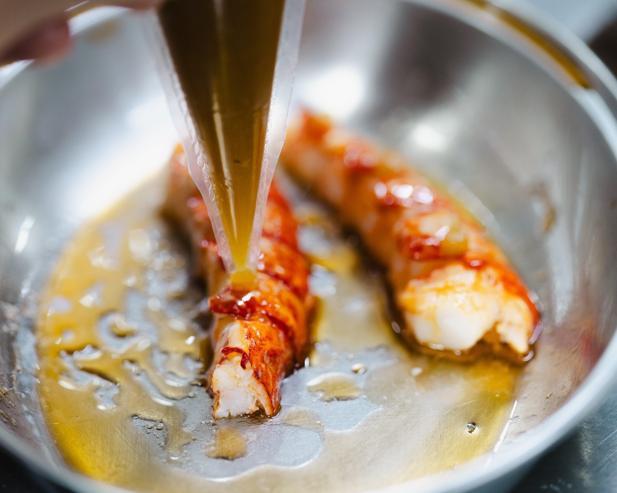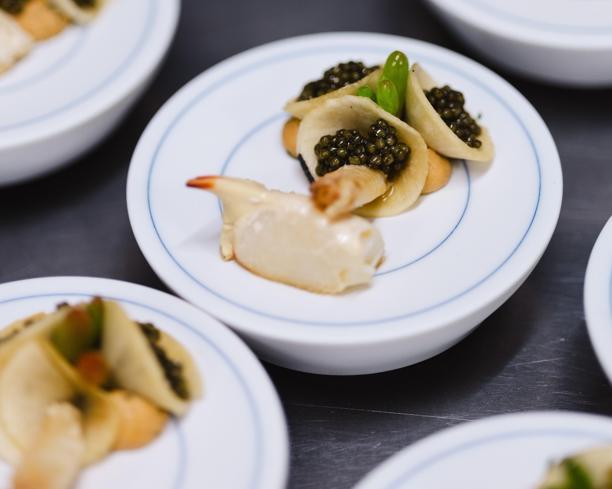
Parisian elegance, London precision and Istanbul’s emotion came together in one menu. Three chefs, three cities, one story: An evening that proved it is indeed possible to speak together in gastronomy without losing one’s voice.
In recent years, “four hands” and “six hands” dinners have almost become the new social game of gastronomy. Chefs come together, menus merge, plates are lined up one after another… Yet, not every example of this trend carries the same finesse. Sometimes the spotlight outshines kitchen harmony; sometimes “collaboration” exists only on the printed menu. But when multiple chefs come together, what should emerge is not two signatures, but a shared rhythm.
Cooking with more than one pair of hands may sound like collaboration, but in truth, it is an exercise in delicate balance — especially for chefs who have never worked side by side before. Because here, the goal is not merely to align plates in sequence; it is to create a space where different techniques, disciplines and egos can breathe together. Each chef brings their own culinary memory, rhythm and approach to ingredients, but to touch the same plate, to share a sauce, to align heat, timing and salt requires as much empathy as mastery. In gastronomy, such collaborations demand not only harmony of flavor but also synchronization of thought.

True harmony doesn’t come from recipes — it comes from listening. And finding that balance where different schools of cooking collide is one of gastronomy’s most fragile yet most creative moments.
Recently, I had the opportunity to witness such a moment myself. Three chefs — David Bizet, Claude Bosi and Fatih Tutak — each carrying a unique tone from their own culinary scene, came together to craft a shared table. The second stop of Three Chefs, Three Feasts by The Peninsula took place on Sept. 29 at The Peninsula London’s iconic restaurant, Brooklands by Claude Bosi. Paris with L’Oiseau Blanc, Istanbul with Gallada, London with Brooklands… three different cities, three different tempos, yet one table set beneath the Peninsula name. The aim was far beyond simply assembling a “collaboration menu”; it was about inviting guests into a refined dialogue that wove together the spirit of the cities, the terroir of their ingredients and the personal stories of the chefs.
Preserving one’s voice while sharing a common theme requires not just technical precision but emotional intelligence. The evening’s menu proved it could be done: Each chef carried the memory of their own city, yet they all ended their sentences in the same language. Each contributed two dishes, alongside an opening amuse-bouche designed to set the tone. Among the opening bites, the one that caught my attention most was David Bizet’s plant-based oyster — a single mouthful that, to me, defined the evening’s theme: naturality, elegance and clarity. The idea was to recreate the refreshing sensation of a classic mignonette (a shallot-vinegar sauce traditionally served with raw oysters) without using oysters at all, relying solely on plant-based ingredients to achieve that delicate illusion.
After the introductions, the spotlight turned fully to David Bizet. At L’Oiseau Blanc in Paris, Bizet is known for blending classical French technique with contemporary intuition. Here, he crafted the night’s most refined marine narrative with two dishes: Natural Crab and Pearly Blue Lobster.
“Natural Crab,” served with seaweed, fennel and a crustacean shell sorbet, offered a perfect balance that captured the full iodine backbone of the ocean. Each of Bizet’s plates revealed a concentrated yet restrained harmony — intense without aggression, deep without heaviness.

Then, the tone of the kitchen shifted; Istanbul’s voice took the floor.
Fatih Tutak, a chef deeply rooted in his own heritage yet speaking to a global audience, brought emotion to the table. His Flying Carpet was a reflection of one of the most beloved narratives in his cuisine: “Layered memory.” Grilled eggplant, peppers and tomatoes formed the foundation, topped with a smoked yogurt-labneh sauce, pistachio and basil; at the table, a spoonful of Oscietra caviar was added, lending a sophisticated minerality to the dish.
My Mom’s Mantı, a creation Tutak has served since his days in Bangkok, appeared here in perhaps its most refined form yet. Each bite-sized dumpling, with its delicately juicy center, was paired with smoky yogurt from Denizli and finished with butter infused with dried mint and red pepper. In this dish, emotion guided technique; the moment when memory modernizes itself was palpable. The feeling of “home” does not vanish in a fine-dining setting — if anything, it becomes more visible.
The finale came from Claude Bosi, with his Racan Guinea Fowl. Prepared with Scottish razor clams and sea beet, the dish built a quiet but powerful bridge between terrestrial protein and the mineral notes of the sea. Bosi’s trademark elegance was immediately apparent: the flavors didn’t compete — they conversed. The sweet-mineral tone of the razor clams softened the bird’s texture, finishing with a clean marine breath.
The progression of this menu was as clever as its content: the appetite awakened first by the sea’s acidity, then steadied by Tutak’s warm, spicy and emotional wave, and finally calmed by Bosi’s refined simplicity. The rhythm of this sequence transformed the meal into a narrative.
The Three Chefs, Three Feasts by The Peninsula series began in Paris at L’Oiseau Blanc, continued in London and will conclude on Oct. 21 at The Peninsula Istanbul – Gallada.
Each city carries its own voice, yet all echo under the same roof. This is more than a brand collaboration; it is an exercise in polyphonic dialogue within gastronomy. What we witnessed that night was proof that three cities, three cultures and three chefs can coexist as parts of a whole without blending into sameness.
David Bizet brought water and finesse; Claude Bosi offered structure and restraint; and Fatih Tutak added emotion and memory.
Together, they composed not just a menu, but a story — one that reminded us that in gastronomy, true harmony is not about uniformity, but about learning to listen.
